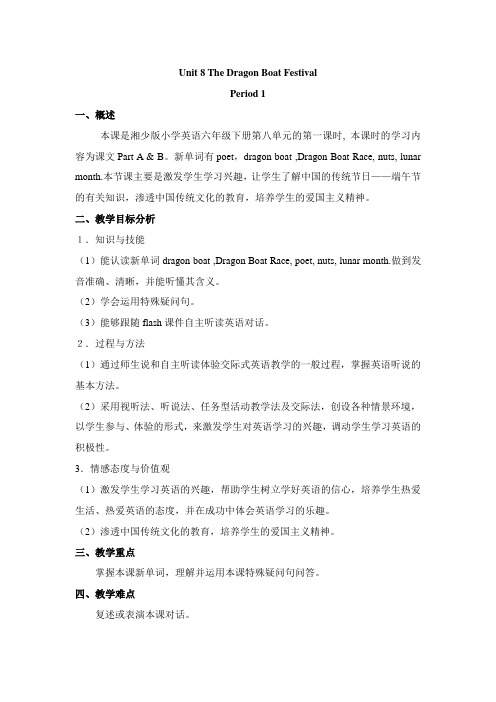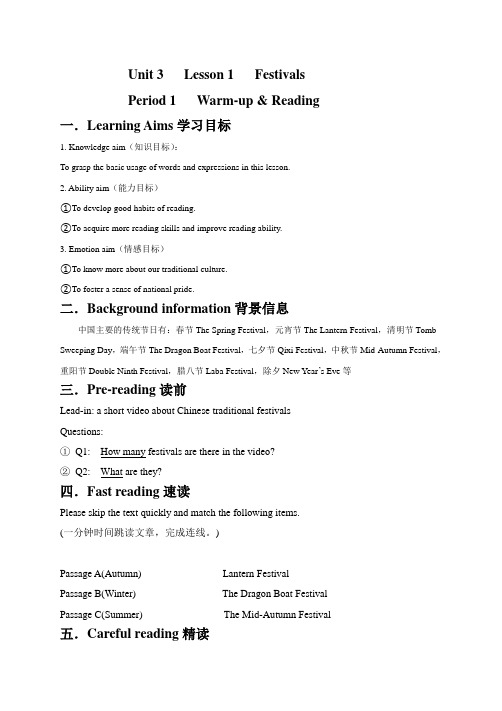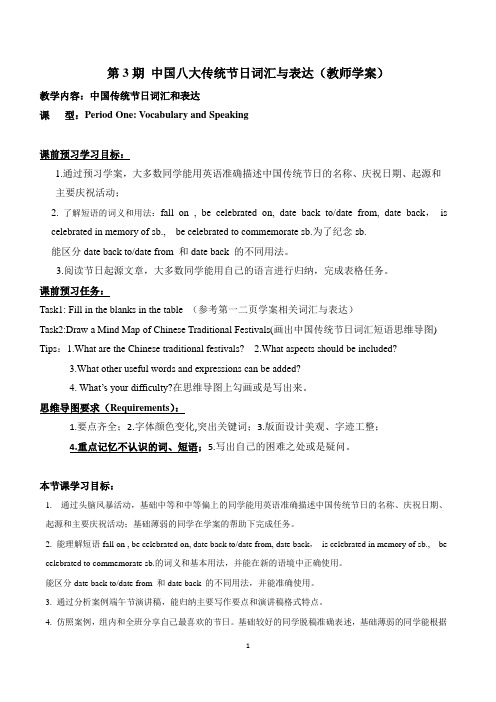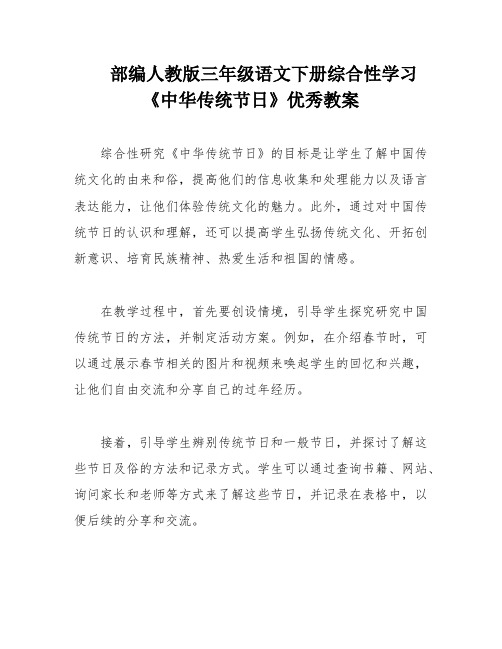The Dragon Boat Festival教案
Unit 8 The Dragon Boat Festival教学设计

Unit 8 The Dragon Boat FestivalPeriod 1一、概述本课是湘少版小学英语六年级下册第八单元的第一课时, 本课时的学习内容为课文Part A & B。
新单词有poet,dragon boat ,Dragon Boat Race, nuts, lunar month.本节课主要是激发学生学习兴趣,让学生了解中国的传统节日——端午节的有关知识,渗透中国传统文化的教育,培养学生的爱国主义精神。
二、教学目标分析1.知识与技能(1)能认读新单词dragon boat ,Dragon Boat Race, poet, nuts, lunar month.做到发音准确、清晰,并能听懂其含义。
(2)学会运用特殊疑问句。
(3)能够跟随flash课件自主听读英语对话。
2.过程与方法(1)通过师生说和自主听读体验交际式英语教学的一般过程,掌握英语听说的基本方法。
(2)采用视听法、听说法、任务型活动教学法及交际法,创设各种情景环境,以学生参与、体验的形式,来激发学生对英语学习的兴趣,调动学生学习英语的积极性。
3.情感态度与价值观(1)激发学生学习英语的兴趣,帮助学生树立学好英语的信心,培养学生热爱生活、热爱英语的态度,并在成功中体会英语学习的乐趣。
(2)渗透中国传统文化的教育,培养学生的爱国主义精神。
三、教学重点掌握本课新单词,理解并运用本课特殊疑问句问答。
四、教学难点复述或表演本课对话。
五、教学过程Step 1:Warming up1.Greetings.2.Revision:Talk about the price of the bag.PPT 呈现三个不同颜色的包,一个红色的200元,一个蓝色的100元,一个橙色的50元。
T: What can you see?Ss: Three bags.T: Very good. Please say something about these three bags.S1: The red one is 200 yuan.S2: The blue one is 100 yuan.S3: The orange one is 50 yuan.T: You did a very good job. Then which one is the most expensive?S1: The red one is the most expensive.T: Which one is the least expensive?S2: The orange one is the least expensive.T:Which one is more expensive than the blue one?S3: The red one【设计意图】复习上一单元学习的比较级与最高级。
外研版英语六年级上册Module4Unit2Period1教案与反思2022

Unit 2Our favourite festival is the Spring Festival.Period 1本课时为第四模块第二单元的第一课时,主要学习教材第23页的内容。
活动1通过大明和西蒙谈论在中秋节和端午节吃什么的场景呈现新词moon cake、the Mid-Autumn Festival、the Dragon Boat Festival;活动2通过四段描述中国传统节日的小短文呈现了新词race、the Lantern Festival、hang以及重点句型“形容词性物主代词/名词所有格+favourite festival is+节日名词”。
让学生能够用所学词汇和句型介绍中国节日,并表达自己对节日的喜好。
知识目标1.能够听、说、认读词汇:moon cake、the Mid-Autumn Festival、the Dragon Boat Festival、race、the Lantern Festival、hang。
2.能够用句型“形容词性物主代词/名词所有格+favourite festival is +节日名词”描述某人最喜欢的节日。
能力目标1.能够用所学词汇和句型描述某人喜欢的节日。
2.能够用所学词汇和句型介绍中国节日,并比较中西方节日的差异。
3.能够用正确的语音、语调朗读课文。
情感目标教育学生热爱中国文化,增强学生的爱国意识。
教学重点能够在实际情景中描述某人喜欢的节日。
教师讲解句型,并创设真实情景,带领学生反复操练该句型,以突破重点。
教学难点能够灵活运用所学词汇和句型介绍中国的节日。
学生反复朗读课文,熟悉课文内容,然后仿照课文内容介绍中国的传统节日。
学生可分组讨论完成任务,有问题向教师寻求帮助。
多媒体课件、录音机、图片。
Step 1:Warm-up教师播放关于中国传统节日的英文歌曲,第一遍学生静听,感受其旋律;第二遍师生一起跟着音乐小声哼唱;第三遍师生一起大声唱出来。
北师大版高一英语必修一3.1《festivals》教案设计

Unit 3 Lesson 1 FestivalsPeriod 1 Warm-up & Reading一.Learning Aims学习目标1. Knowledge aim(知识目标):To grasp the basic usage of words and expressions in this lesson.2. Ability aim(能力目标)①To develop good habits of reading.②To acquire more reading skills and improve reading ability.3. Emotion aim(情感目标)①To know more about our traditional culture.②To foster a sense of national pride.二.Background information背景信息中国主要的传统节日有:春节The Spring Festival,元宵节The Lantern Festival,清明节Tomb Sweeping Day,端午节The Dragon Boat Festival,七夕节Qixi Festival,中秋节Mid-Autumn Festival,重阳节Double Ninth Festival,腊八节Laba Festival,除夕New Year’s Eve等三.Pre-reading读前Lead-in: a short video about Chinese traditional festivalsQuestions:①Q1: How many festivals are there in the video?②Q2: What are they?四.Fast reading速读Please skip the text quickly and match the following items.(一分钟时间跳读文章,完成连线。
【范文】Dragon Boat Festival教案1

Dragon Boat Festival教案1 module1citylifeUnit3DragonBoatFestivalThefirstperiod:Reading:QuyuanandtheDragonBoatFestiv alLanguagefocus:.Asking‘wh-’questionstofindoutthereasone.g.whydopeoplecelebrateit?ingthesimplepasttensetotalkaboutpastactivitiesa ndstatese.g.Quyuanwasbornabouttwothousandyearsagoinchina.ingthesimplepresenttensetotalkaboutpresentstate se.g.Today,peopleeatricedumplingsandhavedragonboatra cesto…keyanddifficultpoints:.Thesimplepasttenseoftheverbsinthestorye.g.wasborn,loved,took,died,lostect.2.Somephrasese.g.wouldliketodosth.,beborn,takeone’sadvice,listentosb.…3.Remindstudentstopayattentiontotheuseofdifferentte nseswhentalkingaboutthepastandthepresentinthestory.Preparationbeforeclass一.Givethesimplepasttenseoftheverbsbelow.Is______take_______die_______lose______jump_____Love______listen_______eat璤_____buy______give_____二.TranslatethephrasesintochineseorEnglish.thestoryofthefestival___________2.giveadviceto__________3.abouttwothousandyearsago_____________4.indanger________5.loseabattle_________6.listentosb_____7.端午节_______________8.赛龙舟____________9.农历五月初五________________10.想要干某事___________1.在那一天_____________2.听从某人的建议____________三.Readthestory,thenanswerthefollowingquestions..whenwasQuyuanborn?__________________________.2.whatwasQuyuan’sjob?_______________________________.3.whywasQuyuansad?______________________________.4.Howdidhedie?__________________________.5.whenistheDragonBoatFestival?_____________________________.6.HowdopeoplerememberQuyuantoday?____________________________.Teachingprocedure:.Talkaboutsomefestivals,suchas:Newyear;women’sDayect.2.whatdoyouknowaboutDragonBoatFestival?).whenisit?2).whatdotheydo?3)whydopeoplecelebrateit?3.HowmuchdoyouknowaboutQuyuan?4.ListentothetaperecordingthentrytoanswertheQuestio nsandfillintheblanks.5.TrytotalkaboutQuyuanwithus.consolidationinclass:一.Fillintheblankswithproperwordsinthepassage..Hewasverysadbecausehiscountrylosttheb_______.2.Thek______alwayslistenedtohim.3.Pleasetaketheteacher’sa_________.4.Quyuanlikedhisc________verymuch.5.chinesepeoplec_________theDragonBoatFestivalevery year.二.FillintheblanksQuyuan__________abouttwothousandyearsagoinchina.He_______ hiscountryverymuch.Hisjob_____to____________theking.Thekingalways_____________.However,theking______andthenewking_________listentohim.Later,thenewking_____abattlebecausehe_______takeQuy uan’sadvice.Thecountrywas__________.Quyuan_____verysad. He______intoariverand_____.Itwas_________________of thatyear.Today,peopleeat___________andhave_______________tor ememberhimonthatdayeveryyear.Afterclass一.Fillintheblankswiththeproperformsofthegivenverbs..wouldyoulike_________it?Doeshelike_______?2.we__________athomeonSundays.He______toclassesever yday.3.She________manythingsinthesupermarketyesterday.4.canyou________aletterinEnglish?5.Look!Someboys_______________afootballgame.6.myfather’sjobis___________sickpeoplebetter.二.Rewritethefollowingsentencesasrequired..TheLisdidn’tgotoarestaurantlastSunday.TheLis______________arestaurantlastSunday.2.Peterwasborntwentyyearsagoinchina._________and_________wasPeterborn?3.Alicegotupearlythismorningtocatchthefirstbus._________________Alicegetupearlythismorning?4.Ittookmehalfanhourtodothehousework.______________________it______youtothehousework?Thesecondperiod:Listeningandspeaking:Ricedumplings Languagefocus:.Theusesof“with”and“without”2.Thedrills:Ilike…Idon’tlike….Doyoulike…?3.Theuseof“ones”Preparationbeforeclass:一.TranslatethephrasesintoEnglish..咸粽子____________________2.甜粽子_________________3.咸肉粽___________________4.没豆子的甜粽___________________5.有豆子的甜粽_________________6.没肉的咸粽__________________二.completethefollowingdialogue..A:wouldyoulikesomericedumplings?B:__________________________________.2.A:Doyoulikepizza?B:_______________________.3.A:whywasQuyuansad?B:_________________________.Teachingprocedure:.Review2.Sayoutdifferentkindsofricedumplings.3.Listenandanswerthequestions.4.Askandanswer.5.Doasurveythendrawabarchartonpage16.consolidation一.choosethebestanswer1.Ilikecoffee______milk.A,aboutB,ofc,withD,for2,Thearemanyskirtsintheshop.Doyoulikethered_______?A,oneB,onesc,one’sD,once3,Itisnotpolitetoleave________sayinggoodbye.A,toB,forc,withD,without4,weshouldn’tgotoschool_________breakfastinthemorning.A,withB,forc,withoutD,about5,Idon’tlikethereddress.Iwouldrather________A,theblueoneB,buytheblueonec,blueD,buyblueone二.Fillintheblankswithproperwordstocompletethepassa geTodayisthelastSaturdaybeforechristmas.Almosteveryon eintheUSAiss_______forpresents.Itissnowingandpeople arewalkingveryfast.Theyaremovingf____shoptoshop.Int heshops,childrenarelookingfortheirt_____andtalkingt oFatherchristmas.Heisaskingthemwhattheywantforchris tmas.IntheUSAitiswarmandbeautifuliinsummer.Thetreesandfi eldsaregreenthen,butnowitiswinterandeverythingisw__ ____.Atnight,therearedifferentc______.Thousandsofsmalllightsdecoratethehousesandbuildingsofeverytown.T hessebrightred,blue,orangeandyellowlightshelpm_____ __christmasabeautifultimeoftheyear.Thethirdperiod:ListenandsayLanguagefocus:.Usingmodalstomakeanoffere.g.wouldyoulikesomericedumplings?ingformulaicexpression_rstoacceptofferse.g.yes,please.Ilikericedumplings.ingformulaicexpression_rstodeclineofferse.g.No,thanks.Idon’tlikericedumplings.ingmodalstoiindicatepreferencese.g.I’dratherhaveapieceofpizza.consolidation一.choosethebestanswers.wouldyou________somecookies?A,lovetoB,liketoc,likeD,rather2.Idon’tlike7-up.I______havesomecoke.A,wouldlikeB,wouldratherc,wantD,like3.Thekingalwaystook_____advice.A,heB,hisc,himD,hers4.Hedoesn’tlikecoke.He’drather_______somewater. A,drinkB,drinksc,todrinkD,drinking5.Ateacher’sjobis__________studentsknowledge. A,teachB,teacheresc,toteachingD,toteach6.Theteachersoftengiveussome________.A,adviseB,advicec,advisesD,advices二.choosetheproperwordsfromthebracketstocompletethe sentences..Themid-autumnFestivalis______thefifteenthdayof theeighthlunarmonth.2.How______doyouknowabouttheDragonBoatFestival?3.Eddielikethe_______ricedumplingswithmeat.4.Decemberisthe_______monthofayear.5.Ilikemilk______sugarbecausesugarkeepsmefat.6.Thejobforadoctoris_________people’slives.三.Rewritethesentencesasrequired.mymotherdidsomecleaninglastnight.mymother____________anycleaninglastnight.2.Theteacheroftengiveussomeideas.Theteachersoften_____someideas_____us.3.weknowalittleaboutQuyuan.____________youknow…?。
2023年高考英语作文传统文化系列:中国八大传统节日词汇与表达Period One (教师教案)

第3期中国八大传统节日词汇与表达(教师学案)教学内容:中国传统节日词汇和表达课型:Period One: Vocabulary and Speaking课前预习学习目标:1.通过预习学案,大多数同学能用英语准确描述中国传统节日的名称、庆祝日期、起源和主要庆祝活动;2.了解短语的词义和用法:fall on , be celebrated on, date back to/date from, date back,iscelebrated in memory of sb., be celebrated to commemorate sb.为了纪念sb.能区分date back to/date from 和date back 的不同用法。
3.阅读节日起源文章,大多数同学能用自己的语言进行归纳,完成表格任务。
课前预习任务:Task1: Fill in the blanks in the table (参考第一二页学案相关词汇与表达)Task2:Draw a Mind Map of Chinese Traditional Festivals(画出中国传统节日词汇短语思维导图) Tips:1.What are the Chinese traditional festivals? 2.What aspects should be included?3.What other useful words and expressions can be added?4. What’s your difficulty?在思维导图上勾画或是写出来。
思维导图要求(Requirements):1.要点齐全;2.字体颜色变化,突出关键词;3.版面设计美观、字迹工整;4.重点记忆不认识的词、短语;5.写出自己的困难之处或是疑问。
本节课学习目标:1. 通过头脑风暴活动,基础中等和中等偏上的同学能用英语准确描述中国传统节日的名称、庆祝日期、起源和主要庆祝活动;基础薄弱的同学在学案的帮助下完成任务。
部编人教版三年级语文下册综合性学习《中华传统节日》优秀教案

部编人教版三年级语文下册综合性学习《中华传统节日》优秀教案综合性研究《中华传统节日》的目标是让学生了解中国传统文化的由来和俗,提高他们的信息收集和处理能力以及语言表达能力,让他们体验传统文化的魅力。
此外,通过对中国传统节日的认识和理解,还可以提高学生弘扬传统文化、开拓创新意识、培育民族精神、热爱生活和祖国的情感。
在教学过程中,首先要创设情境,引导学生探究研究中国传统节日的方法,并制定活动方案。
例如,在介绍春节时,可以通过展示春节相关的图片和视频来唤起学生的回忆和兴趣,让他们自由交流和分享自己的过年经历。
接着,引导学生辨别传统节日和一般节日,并探讨了解这些节日及俗的方法和记录方式。
学生可以通过查询书籍、网站、询问家长和老师等方式来了解这些节日,并记录在表格中,以便后续的分享和交流。
在辨别传统节日和一般节日时,老师可以根据学生的回答出示节日名称,并让学生判断哪些是传统节日,哪些不是,并引导他们思考和探讨背后的原因和文化内涵。
同时,还可以比较各个节日的时间,从公历日期和农历日期的区别入手,让学生了解中国古代纪年法和传统节日的历史渊源。
最后,让学生分享和交流课前搜集的资料,加深对传统节日的认识和理解,并培养他们的合作精神和团队意识。
通过这样的综合性研究,可以让学生更好地了解和体验中国传统文化的魅力,提高他们的文化素养和综合能力。
Before class。
XXX to share with the class。
(Students and teachers can exchange n and supplement each other。
while the teacher writes on the board about customs。
food。
origins。
legends。
and poetry.) (Display on the screen: XXX。
Qingming Festival'XXX activities。
七年级英语TheDragonBoatFestival课件

制作过程
制作龙舟需要选材、设计、雕刻和彩绘等多个 工艺过程。
中国文化和神话中的龙的意义
1 祥瑞瑞兽
2 神话故事
3 形象多样
龙在中国文化中象征祥 瑞、权力和智慧。
龙在许多中国神话故事 中扮演重要角色,是守 护神和天神的象征。
中国文化中的龙具有多 种形象,在不同地区和 时期有所差异。
和民众做出了巨大的贡献。
3
古老的传说
端午节起源于中国古代,有着丰富的 传说和故事。
历史演变
随着时间的推移,端午节逐渐演变成 为一个重要的中国传统节日。
端午节的传统习俗
赛龙舟
龙舟竞渡是端午节的标志性习俗,代表着屈 原遗身江中的故事。
系艾草
人们在门前或身上系艾草,以驱邪避疫和祈 求平安。
吃粽子
粽子是端午节必不可少的食物,由糯米和馅 料包裹而成。
挂菖蒲
挂菖蒲也是一种庆祝端午节的习俗,有驱邪 和祈福的作用。
端午节在中国文化中的重要意义
端午节是中国文化的重要组成部分,体现了中华民族的凝聚力、包容性和传统价值观。
与端午节相关的美食特色
粽子
粽子是端午节的代表美食,用 糯米和馅料包裹,味道美味独 特。
雄黄酒
雄黄酒是端午节的传统饮品, 有辟邪驱瘟的功效。
七年级英语 TheDragonBoatFestival课 件
这个课件将带领你探索中国的传统节日——端午节。我们将了解端午节的起 源和历史、传统习俗、食物特色和龙舟赛。还会探讨端午节在中国文化中的 重要意义,以及节日庆祝在不同地区的差异和节日对社会的积极影响。
端午节的起源和历史
1
屈原的牺牲
2
屈原是端午节的重要人物,他为国家
咸鸭蛋
人教版九年级英语第二单元教案

Unit 2 I think that mooncakes are delicious! 教案Period 1 Section A 1a-1cTeaching aims :VocabularyWords : mooncake,lantern,the Water Festival, the Dragon Boat Festival, Spring Festival, the Lantern Festival,a little too crowdedTarget language:1. What a great day!2. Bill thinks that the races were not that interesting to watch.3. Bill wonders whether they’ll have zongzi again next year.Ability objects :1learn the new words and target language by themselves.2. learn to study the objective clauses and exclamatory sentences.3. improve their listening and speaking skills.Moral object:Learn to study on their own ,know about China’s and other countries’ festival culture and love Chinese culture.Key points:1. learn the new words and target language by themselves.2. learn to study the objective clauses and exclamatory sentences.3. improve their listening and speaking skills.Difficult points :1learn the new words and target language by themselves.2. learn to study the objective clauses and exclamatory sentences.Before class :Ask students to learn the new words by themselves ,students can ask the teacher for help or listen to the tape and check for the first time.Teaching proceduresStep 1 Show the goals and lead in :1. Let’s enjoy a video and answer the questions.1). What words can you understand by yourself, please write them down.2). What festival does it talk about ?Step 2 Presentation.1.Let’s know other traditional festivals.the Water Festival, the Dragon Boat Festival, Spring Festival, the Lantern Festival2. Can you say like this :How________ they are on the dragon boat!1What a great day the Water Festival is!3. What do you think of these festivals ?Please say like this:I think that Spring Festival is_____I believe that Spring Festival is_____Step 3 Listening1.Mary and Bill just had a great day on Dragon Boat Festival. They are talking aboutwhat they like best about this festival. Listen to their conversation and circle T or F.2. Check the answers.3. Follow the tape.Step 4 Pair work.1.1c Talk about the pictures in 1a. Or make your own conversations.Examples 1A: What do you like best about the Dragon Boat Festival?B: I love the races. I think they’re fun to watch.Examples 2A Hi,…Of all the traditional festivals, which is your favorite festival?B Well, I like the Chinese Spring Festival best?A What do you like best about …?B I love the feeling that all the family member get together …Step 5 read and think.Read the sentences and find the tules.1.What a great day!2.How fantastic the dragon boat teams were!3. How pretty they were!I guess it was a little too crowded.I wonder if they’ll have the races again next y ear.I believe that I’ll be back again next year to watch the races!Step 6 Summarize.Think about what you learned from this class.Step 7 Homework.2Period 2 Section A 2a-2dTeaching aims :VocabularyWords : stranger, relative, put on, poundTarget language:I believe that we ate at least five meals a day!How delicious the food is!I’ve put on five pounds.I wonder whether June is a good time.Ability objects :1learn the new words and target language by themselves.2. learn to study the objective clauses and exclamatory sentences.3. improve their listening and speaking skills.Moral object:Learn to study on their own ,know about China’s and other countries’ festival culture and love Chinese culture.Key points:1learn the new words and target language by themselves.2. learn to study the objective clauses and exclamatory sentences.3. improve their listening and speaking skills.Difficult points :1learn the new words and target language by themselves.2. learn to study the objective clauses and exclamatory sentences.Before class :Ask students to learn the new words by themselves ,students can ask the teacher for help or listen to the tape and check for the first time.Teaching proceduresStep 1 Lead in .3Watch the video and answer:what festival is it ? What do you think of it ?Please say like this :How ___________________!What ________________!I think/ guess/ believe_____________.Step 2 work on 2d.1. Before reading , can you ask questions about the Water Festival in Thailand ?Where / when / what/why…2. While readingRead 2d, and fill in the blanks.3. Role-play the conversationStep 3 Work on 2a &2b.2aWu Ming went somewhere for his holiday.Where did he go? Who did he visit? What did he enjoy best? Read and predict.1 Wu Ming and Harry are cousins/strangers/friends.2 Wu Ming went to Singapore/ Hong Kong/ Macao for his vacation.3 He visited his relatives/friends/classmates.4 He enjoyed eating out/ shopping/ the Dragon Boat Festival best.2bWu Ming did a lot of fun activities, but there were also downslides. Listen again and fill in the chart.Please take notes and use abbreviation.Fun Activities DownslidesEating out putting on five poundsShopping spending so much moneyDragon Boat Festival in June quite hotStep 4 work on 2cRole –play conversations between Wu Ming and Harry. Use the information in 2a and 2b or make your own conversations.A Hi,…Where did you go on your vacation?B I went to…A What did you do there?B I visited…I think that I ate five meals a day and I’ve put on five pounds.A I guess the food was delicious, right? What else did you do?B…A What was the best part of this trip?B I think…4Step 5WritingPlease introduce a Chinese festival you experienced to friends in Thailand.Dear friend in Thailand,I like _______ best. on __________Festival, I/we___________________________. Ithink __________________________....Yours in ChinaStep 6 Summary and homework.第3课时Section B 1a-2e教学目标一、知识与技能1. 掌握本节课重点短语和词汇。
- 1、下载文档前请自行甄别文档内容的完整性,平台不提供额外的编辑、内容补充、找答案等附加服务。
- 2、"仅部分预览"的文档,不可在线预览部分如存在完整性等问题,可反馈申请退款(可完整预览的文档不适用该条件!)。
- 3、如文档侵犯您的权益,请联系客服反馈,我们会尽快为您处理(人工客服工作时间:9:00-18:30)。
